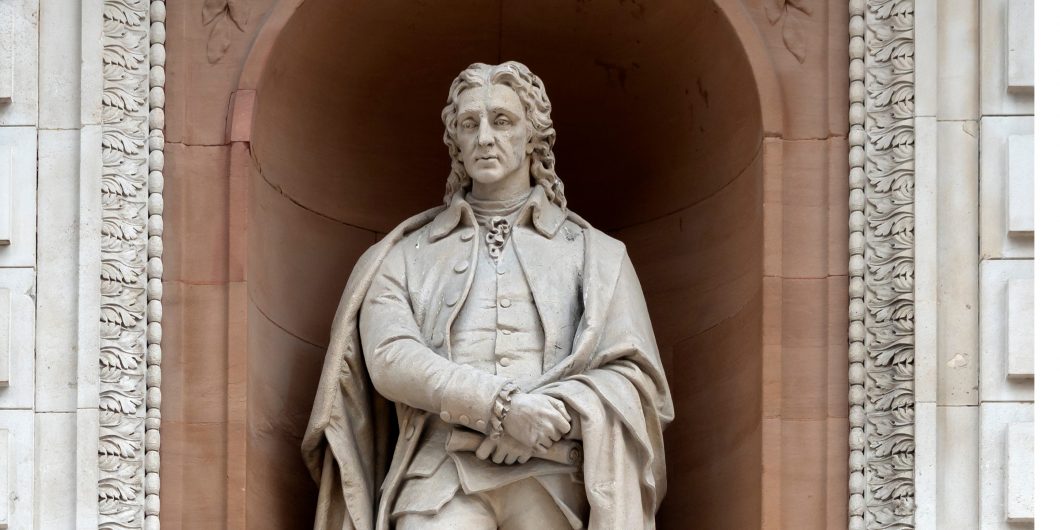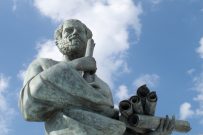Capitalism's Humanity
Is fusionism still a compelling call to conservatives? Where can traditionalists stand among conservatives who do not believe that a transcendent order defines a moral one? Do libertarians have the same philosophic roots as traditionalists? Why does capitalism still require defense by all kinds of conservatives? These are among the questions that linger after reading Donald Devine’s most recent book, but another question seems more important. When the very meaning of the word human being is at stake, is harmonizing traditionalists and libertarians what matters most?
Lovers of liberty—from Burkeans to libertarians—will feel at home in this ambitious book. Devine wants no residual sibling squabbles. Though both camps have been ambling along since Frank S. Meyer and William F. Buckley called for a cessation of conflict, the implicit urgency of the book is that stronger and broader alliances need to be forged. In Herodotus’ account, Spartans and Athenians placed their Greekness above their rivalry, because the barbarians under Xerxes were coming back. Conservatives are confronted with an ideology as challenging to American principles as was the force of the Persians to the Greek allies. While threats to personal and institutional liberty can and do animate spirited responses, the shared love for liberty might not be enough to fight the ideologues of our day.
Can a renewed trust in capitalism be the magnet for a broader alliance? Surely, capitalism needs defenders with Devine’s intellectual armor. Capitalism has for some time ceased being the first target of its several critics. Authority and the given-ness of Nature seem to have taken its place. But Devine chooses to take on the frontline critics of capitalism today, namely Pope Francis, while devoting no little energy to engaging with critics such as Marx in tracing, the development of free markets since the Middle Ages and the development of towns and the emergence of the bourgeoisie. Nonetheless, the reader is not satisfied with a display of the benefits of capitalism to the human good—and neither is Devine. I suspect that the cri de coeur of this book issues from a religious, a spiritual concern.
Pope Francis, at the other side of the spectrum from Devine, likely has more citations than any other figure in a book. Although he is generous at first in his excuses for the Holy Father, Devine writes that “The experience of his native country had a searing effect on Jorge Mario Bergoglio….” He holds forth on the growth and decline of free markets in Argentina, suggesting that Bergoglio’s experience of “crony capitalism” goes far in explaining his two encyclicals. The Pope’s concern for the poor and his distrust of the “invisible hand” owe to a bad experience in a country that moved from a healthy capitalism to socialism. Though not faulting him for his provincial ignorance, Devine loses patience further on: “Actually, the pope’s criticism went much deeper than the faults particular to Argentina’s brand of capitalism.” He continues, “He saw affluence and freedom themselves as breeding mindless commercialism, prurient escapism, and selfish indifference to the needs of others.” The rest of Devine’s work is usually a direct and sometimes indirect refutation of the “pope’s view” that “even if capitalism was successful on its own terms, generating material prosperity, its possessive individualism and unrestricted freedom made it impossible to defend as a moral system.” Devine is intent on employing philosophic arguments, historical references, economic analysis, and a wealth of statistics, to show that the Pope is wrong.
Devine sets himself a Herculean task when he makes use of major studies proving that poverty remains unsolved and families are more fractured than ever following the expansion of the welfare state. He is exceedingly equal to the task of exposing the failures of each. This territory is his bailiwick. Under Reagan, as Director of the U. S. Office of Personnel Management (OPM), Donald Devine was charged with the seemingly Augean task of reducing the bureaucracy and revamping the civil service. He uses his immense knowledge and experience in this area to respond to Pope Francis hope for a “comprehensive plan to address important global problems,” thus echoing Weber’s view that the most efficient path for the nation-state to take was to “rely upon the rationalized bureaucratic administrative state.” “The Expert Bureaucracy Solution,” as Devine calls this claim, is not only an inflated hope but damaging to civic virtue, social integrity, and the budget. Above all, the expert solution is inefficient.
It is perhaps the philosophic errors and deficiencies of both the left and the right that prompt Devine to offer a comprehensive historical account of freedom versus statism, but his perspective stretches perhaps too far, even to primitive man, where he uses René Girard to describe scapegoating and sacrifice. According to Girard, the cycle of scapegoating is resolved in Christ’s ultimate offering of himself for all. However, in venturing into Girard’s interpretations of ancient texts (such as Euripides’ Bacchae) to illustrate his compelling thesis, Devine loses his sure-footedness. Devine sometimes wanders into a questionable analysis of the ancients. For example, in referencing Aristotle on slavery, he misses Aristotle’s shocking rejection of slavery by conquest as well as his nuanced discussion of the master-slave relationship.
The historical scope and wealth of scholarship in Enduring Tension is astonishing. Perhaps this is why the scope seems a bit desperate, as though Devine had to sketch all that ought to be provided by a genuine education in poetry, history, political philosophy, and theology.
And Divine’s mistakes about the ancients have consequences for his argument. In discussing the aim of the polis, Devine assumes Aristotle understands it to operate in necessity and not friendship; yet, Aristotle states that men form the city for the sake of affection. Devine’s misreading of Aristotle seems to lead him to accept a false anthropology backed up by Hobbes, Locke, and Rousseau—that man by nature is a-social. Intrigued by the pre-philosophic view of human nature which Girard sees as envious and naturally a-social, Devine errs, it seems to me, in jettisoning the central core of classical and medieval thought: that man is by nature a social animal. He favors an evolutionary account of man’s political development not unlike the moderns who derailed human nature from its telos, the good. It is this derailment that is fundamentally at fault for the errant anthropology which leads us to ask: have we all forgotten what it means to be human?
Voegelin or Strauss, both of whom he cites throughout the book, could not accept Devine’s conclusion that “Looking at early beginnings puts into question the normal assumption, as in Aristotle, that humanity is naturally social.” Devine then asks, “Agricultural man was social, but was he naturally so?… Girard’s work is important not so much in its specifics as in its perspective on human time and on the power of acquisitive desire, the violence that results, and the necessity of finding a means to control it.” Hobbes and Machiavelli would nod in agreement.
Despite these problematic arguments, one can take pleasure in The Enduring Tension’s exposure of capitalism’s critics, including claims that science undermines the case for capitalism. He shows patience with Hawking and other scientifically minded critics as he pits expert against expert to show that scientists often substitute calculation and hypothesis for real thinking. They see no logos in the material world and invite devotees to find none in themselves. Employing Hayek’s terms of “constructivist” versus “critical rationalism,” Devine cites a catalogue of errors from the dominant scientific methodology driven by an agenda. Devine’s even-handedness should keep the interest even of true progressives. In this section of his book, Devine shows that the soul-less philosophies see things incompletely. By undermining man’s natural relation to the divine they alienate man from himself. Scientific methodology, succumbing to what physicist Donald A. Cowan called “the myth of fact,” suborns questions central to preserving the human person.
Strangely, but perhaps in a way consistent with his dark view of man’s violent nature, Devine sees John Locke as the best spokesman for freedom and capitalism. Locke, he avers, gives us both a Christian and an accurate foundation for human development. The author takes umbrage with both Voegelin’s and Strauss’ critique of Locke, the latter identifying him with “political hedonism.” But it might be useful to recall what Strauss says about Locke in his Natural Right and History: “For the ‘first and strongest desire God planted in man’ is not the concern with others, not even concern with one’s offspring, but the desire for self-preservation.” I find it troubling that, being the astute reader that he is, Devine sees no depreciation of the human capacity when, for instance, Locke says in the Second Treatise that a man will help his fellow man only when he finds it “convenient to do so” or that a son should remain dutiful to his father until his nonage in anticipation of his inheritance. Statements such as these point to a view of human nature without honor, generosity, filial piety, magnanimity, or of what Burke calls “chivalry.”
Concerned with tying his defense of capitalism to his understanding of the American regime, Devine sees Locke as a major positive influence. Though there are strong Lockean threads in the American regime, some of them lamentable (as Patrick Deneen and others have observed), Locke does not give us a full account for how the American regime came to be, either in its pre-founding or founding. Well before Locke, the Mayflower Compact acknowledged the limitations of government, as would John Cotton and others. John Winthrop asserts that bonds of friendship and civic concord are held together by the “ligament” of charity and secured by belief in a higher law. Echoing Cicero, our earliest documents affirm a respect for property, but pre-founding documents did not encourage acquisitiveness but rather praised virtue, especially moderation, justice, and the public good. And though the protection of the “diversity in the faculties of men” from which the “rights of property originate” are the “first object of government” (Federalist 10), as it is for Cicero, the bonds holding men together are named as religion, similar manners and customs, common ancestors, attachment to the same principles of government, and the shedding of blood to protect those principles (Federalist 2).
The historical scope and wealth of scholarship in Enduring Tension is astonishing. Perhaps this is why the scope seems a bit desperate, as though Devine had to sketch all that ought to be provided by a genuine education in poetry, history, political philosophy, and theology. One wonders if among all the cogent summaries of authors from various and divergent perspectives, ancient, medieval, modern, and contemporary, the author has attempted too much. The final chapter, “The Civilizational Choice” insists that capitalism must and does have a moral frame. In his concern for America’s future, Devine states that as “Hayek and Locke argued, a moral legitimizing ideal must have at least a symbolic truth. If we are to rebuild the scaffolding that can hold the walls and preserve a capitalist civilization, some such solution must be explained and implemented.” The problem, as I see it, is that, for both Hayek and Locke, the scaffolding they have in mind is a buttress, not a foundation. Western Civilization does indeed need the “symbolizations of order” of which Voegelin wrote so profoundly. The ordering must be according to human nature as understood by the Judeo-Christian tradition. There is a beauty in living according to our nature, and the beauty has been steadily, rapidly deformed by misdirected desires masquerading as rights. There is at least one way to recover the beauty in the well-ordered human soul. With human nature itself so profoundly in question, I suspect at this point that the way is not primarily through capitalism but through conversion.


